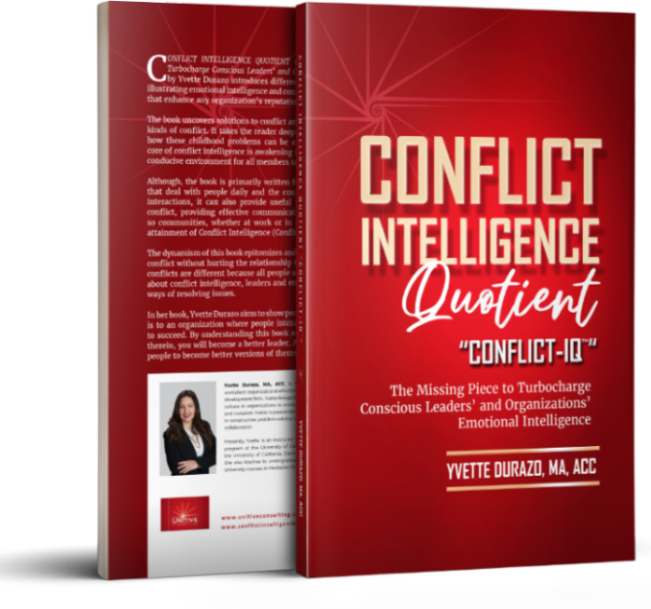BOOK: CONFLICT INTELLIGENCE QUOTIENT "© CONFLICT-IQ"

This book is for professionals who deal with people every day. Conflict cannot be avoided, but we should not let it escalate either. Professionals will see that conflict is not all that bad: with the right mindset and techniques, it can even improve relationships and organizational culture. With excellent conflict resolution skills, people can truly enjoy the communities they work in.
The book uncovers various root causes of conflict and solutions for it. The core of conflict intelligence is awakening individuals’ senses of unity, maintaining a conducive environment where all members can thrive and work in harmony.
This book epitomizes and advocates innovative ways to solve conflict without hurting the existing relationships. It demonstrates that all conflicts are different because all people are different. Therefore, by learning about conflict intelligence, leaders and employees can creatively invent new ways of resolving issues.
- Carucci. R. (2018). 3 Ways Senior Leaders Create a Toxic Culture.
- Conflict in a positive, respectful, and mutually beneficial way. (Ohio State University Extension)
- Emma, S. (2019). Book Summary: The 7 Principles of Conflict Resolution by Louisa Weinstein.
- Emmons, A., R. (2005). Thanks! How Practicing Gratitude Can Make You Happier. ISBN: 978-0-547-08573-9
- Greenberger, D, Padesky, C. (2016). Mind over Mood: Change how you feel by changing the way you think.
- Darlington. R, How to Resolve Conflict – Advice on resolving differences and managing conflict between individuals, small groups, and organizations.
- Kabat-Zinn. J. (1996). Wherever You Go, There You Are: Mindfulness Meditation in Everyday Life
- Resolving Conflict Constructively and Respectfully – Tips on how to manage and resolve
- Kegan, R. 1982. The Evolving Self, Harvard University Press.
- Kegan, R. 1994. In Over Our Heads. Harvard University Press.
- Kegan, R. 2009. Immunity to Change. Harvard University Press.
- Maslow, A. 1976. Further reaches of human nature. New York: Viking Press
- McAdoo. B., Welsh. N., & Wissler. R. (2003). Institutionalization: What do empirical studies tell us about court mediation? Dispute Resolution Magazine.
- Mouser, D. (2018). Workplace violence. Mouser Law firm, PC.
- Robins, S. (2002). A consultant’s guide to understanding and promoting emotional intelligence in the workplace. In Lowman, R. (Ed), Handbook of Organizational Consulting Psychology. John Wiley & Sons, Inc.
- Shipper, F., & Dillard, J. E. (2000). A study of impending derailment and recovery of middle managers across career stages. Human Resource Management, 39, 331−345.
- Taylor, S. N., Passarelli, A. M., & Van Oosten, E. B. (2019). Leadership coach effectiveness as fostering self-determined, sustained change. The Leadership Quarterly, 30(6).
- Kogan, B. E (2020). 3 Effective Strategies to Manage Workplace Conflict. From Blog.dce.harvard.edu
- Larcker, D., Miles, S., Tayan, B., & Gutman, M. (2013). 2013 Executive Coaching Survey. Retrieved September 10, 2015, from Gsb.stanford.edu
- Creighton, K. (2019). 4 Ways to train Your Leaders in Conflict Resolution and Management. From Hrdailyadvisor.blr.com
- Mayer, B. (2004, July). Beyond Neutrality. Retrieved October 14, 2015, from Mediate.com
- Hayes, J. (2008, July). CPP Global Human Capital Report (2008), Workplace Conflict and How Businesses Can Harness it to Thrive. Retrieved July 14, 2015, from Conflict Report PDF.